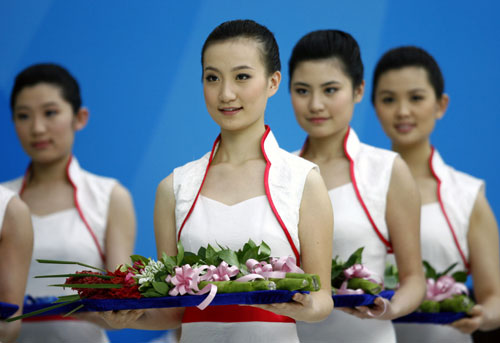BEIJING - The Water Cube's debut event was not all about competition: it's about getting familiar with the water and try out hands six months before the big-time Olympics in the Chinese capital.

Ceremony girls hold flower bouquets at a medal ceremony during the Good Luck Beijing 2008 Swimming China Open at the National Aquatics Centre, nicknamed "Water Cube", in Beijing February 4, 2008. China Open is the first event held in the center, which will host the Olympic swimming and diving events in August. [Xinhua]
|
The Swimming China Open ended its six-day competitions on Tuesday in the bubble-wrapped Olympic venue, with 32 golds bagged by teams including host China, Germany and Japan, the top three on the medal tally.
A sizeable competition force of more than 200 swimmers came to Beijing. Only a few top swimming powers such as the United States and Australia were absent.
But the meet was not short of top-notch swimmers. German sent in the world 100m freestyle record-holder Britta Steffen and world championship silver winner Annika Lurz. Steffen won two gold medals in women's 50 and 100 meters freestyle, while Lurz was crowned in the women's 400 meters freestyle and 100 meters freestyle relay.
World No. 2 butterfly specialist Pawel Korzeniowski of Poland and Sweden's sprinter Stefan Nystrand were also among the few leading swimmers who impressed the spectators in Beijing.
Korzeniowski won his best event in men's 200 meters butterfly and sprint specialist Nystrand claimed the men's 50 meters and 100 meters freestyle titles.
However, Olympic 200m butterfly champion and multiple-medallist Otylia Jedrzejczak of Poland did not think too much about winning golds at the event. "I've been doing intense training," she said.
The Chinese team, headed by top breaststroker Qi Hui and long-distance swimmer Zhang Lin, indeed shared some of the limelight. With two golds and three results under the Olympic qualifying A standards, Qi declared a comeback from being bogged down by failed trainings.
Zhang in turn impressed the home crowd with a new national record in men's 400 meters freestyle, and brought himself closer to world's first-ranking South Korea's Park Tae-Hwan.
But the Chinese team may have to make another few leaps to realize its Olympic ambitions after the retirement of Olympic women 's 100 meters breaststroke gold medallist Luo Xuejuan.
China's No.1 male swimmer and butterfly specialist Wu Peng appeared in the stadium but didn't compete. Wu and some other Chinese swimmers are not in winter training.
The Pool in the Bubble
Water Cube is one of the flagship Olympic facilities, neighboring the Birds Nest, the main stadium.
The facility, which will host swimming, diving, synchronized swimming competitions during this summer's Olympics, offers a huge slice of gold, silver and bronze medals in the Olympics. By then, swimming sensations like Michael Phelps, Australian stars Leisel Jones, Libby Lenton and Laure Manaudou of France, are all poised for the gold rush.
Its debut event has drawn accolades from officials and the athletes. A high-ranking IOC member Kevan Gosper called it "out of this world" and "breathtaking".
Mongolia's Tsogjargal Narantsog, who swam in the men's 100 meters butterfly heat, was officially the first swimmer in the pool.He won cheering applause despite a slow performance. China's Shi Feng also made a few headlines when he won the venue's first gold on offer in men's 100 meters butterfly.
As praises were piled on the center, glitches were also discovered in the test event: mixed zone is too small, change room is too hot and air is too dry. But venue officials assured these problems would be addressed. "The operation teams and other relevant parties will brainstorm on making necessary changes to the facility," said Shang Heshun, director of the venue.
"So far, all operations have gone well and we have gathered valuable experience for the August Olympics," he added.